Unit 3 Could you please clean your room? Section A 3a~4b 课件(共27张PPT)-2023-2024学年人教版初中英语八年级下册
文档属性
| 名称 | Unit 3 Could you please clean your room? Section A 3a~4b 课件(共27张PPT)-2023-2024学年人教版初中英语八年级下册 |
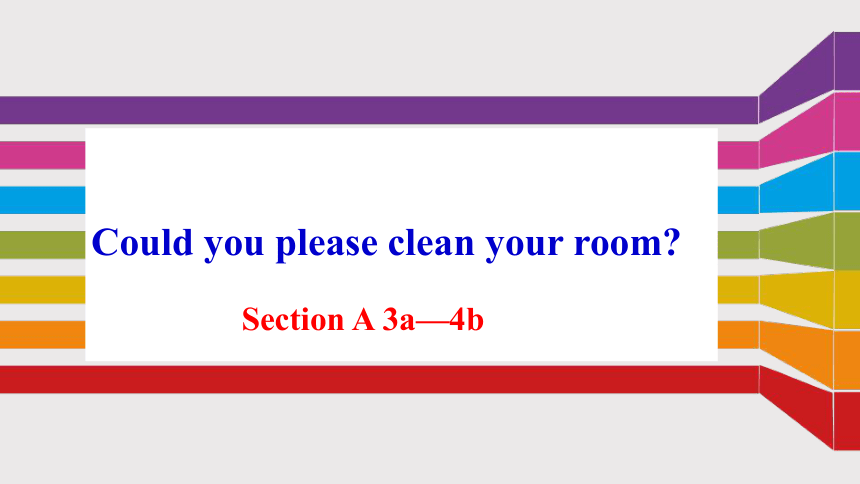
|
|
| 格式 | pptx | ||
| 文件大小 | 990.3KB | ||
| 资源类型 | 教案 | ||
| 版本资源 | 人教新目标(Go for it)版 | ||
| 科目 | 英语 | ||
| 更新时间 | 2024-05-15 00:00:00 | ||
图片预览

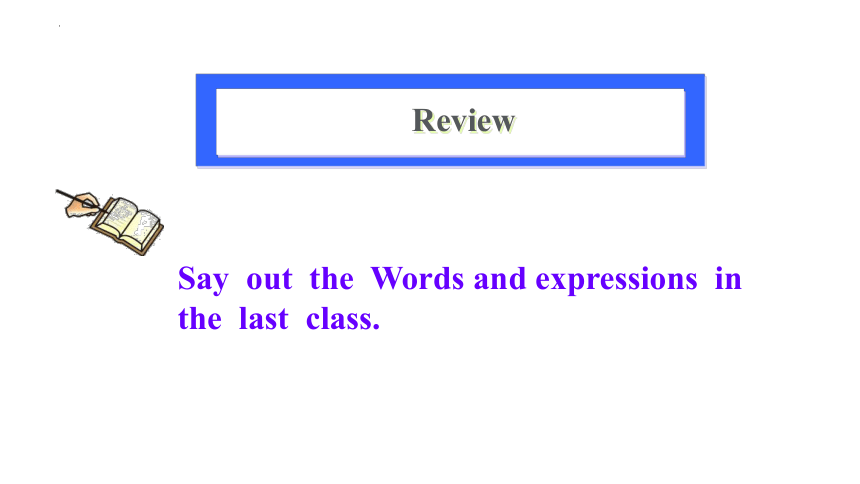
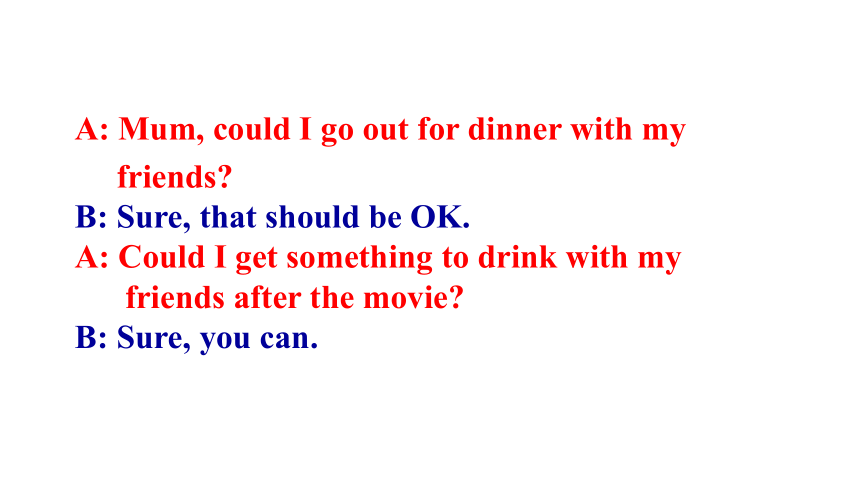
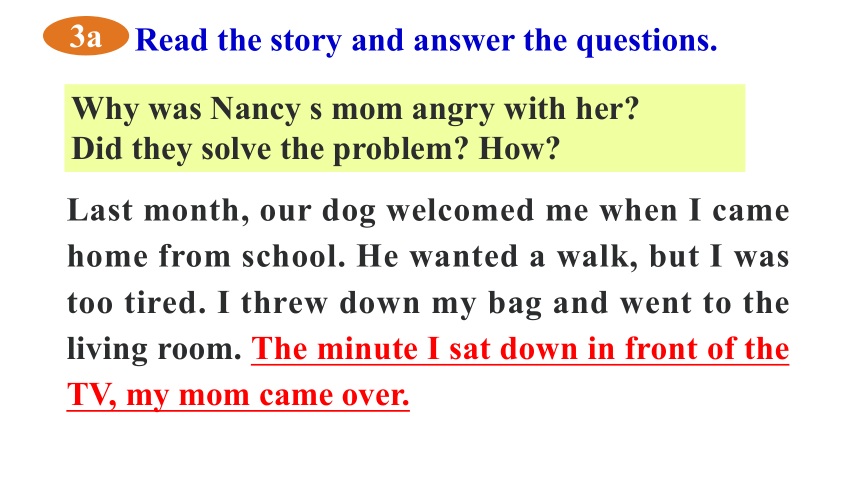
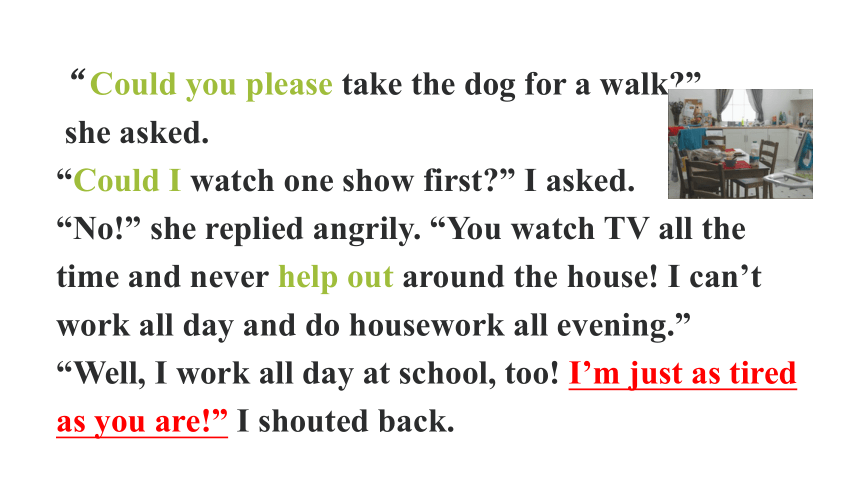
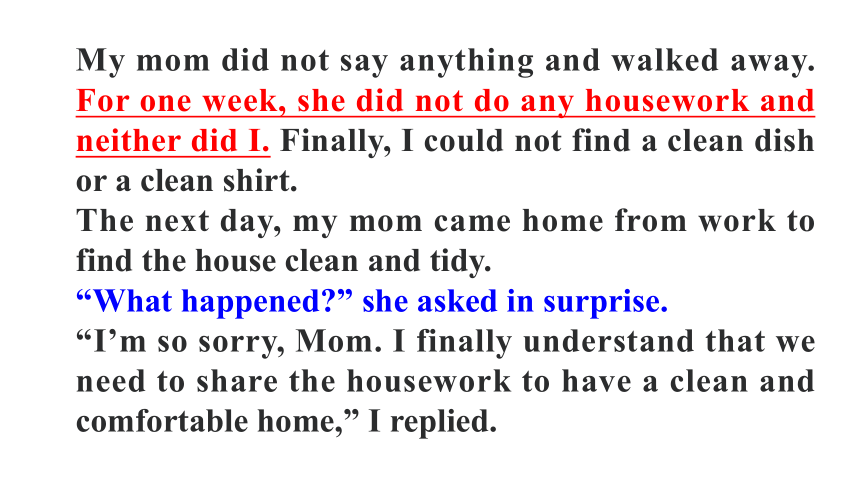
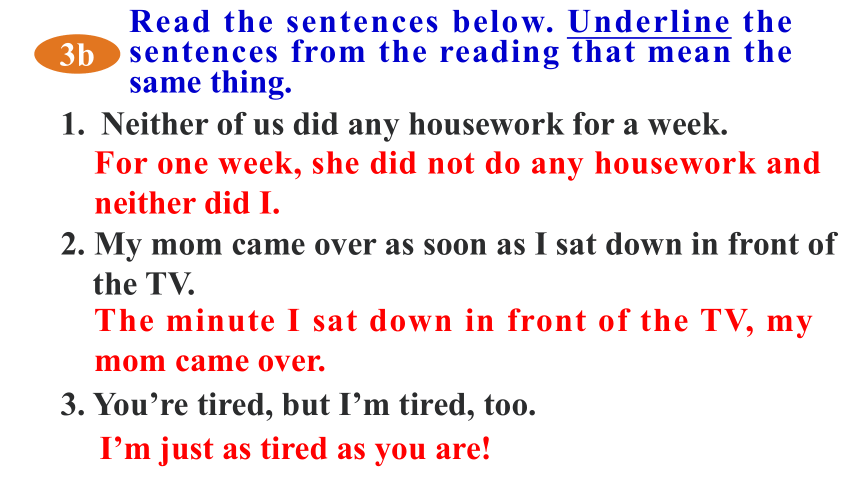
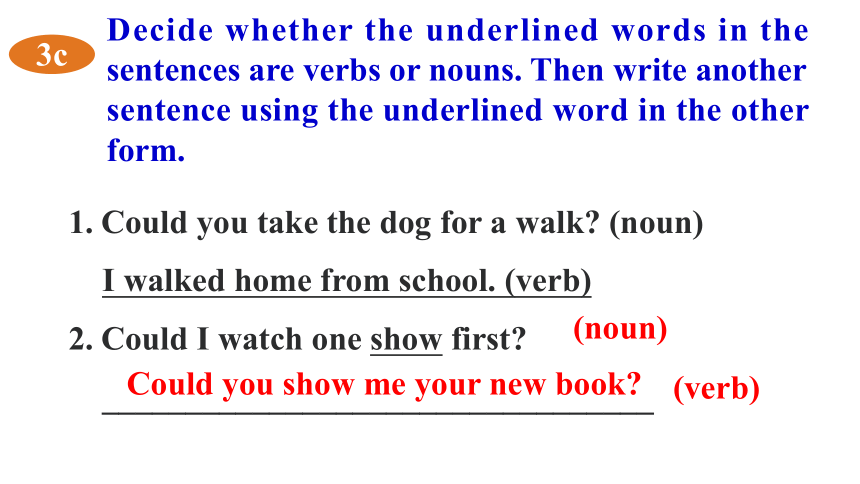
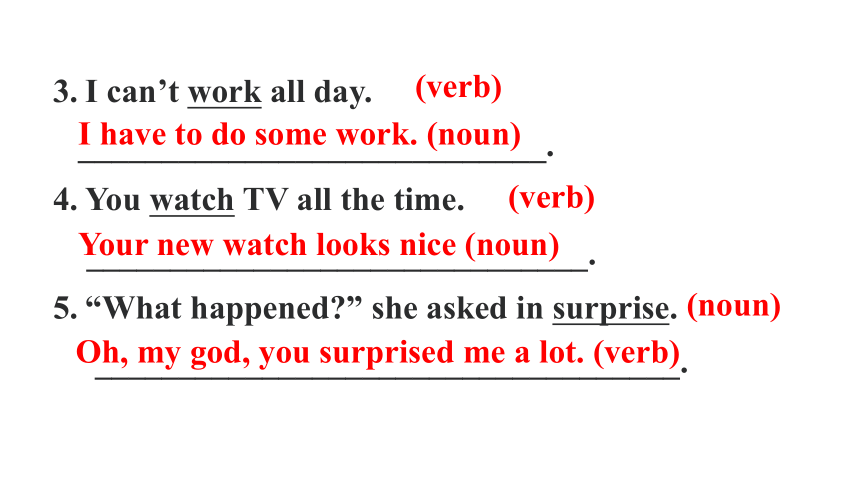
文档简介
(共27张PPT)
Could you please clean your room
Section A 3a—4b
Review
Say out the Words and expressions in the last class.
A: Mum, could I go out for dinner with my
friends
B: Sure, that should be OK.
A: Could I get something to drink with my
friends after the movie
B: Sure, you can.
Read the story and answer the questions.
Last month, our dog welcomed me when I came home from school. He wanted a walk, but I was too tired. I threw down my bag and went to the living room. The minute I sat down in front of the TV, my mom came over.
Why was Nancy s mom angry with her
Did they solve the problem How
3a
“Could you please take the dog for a walk ”
she asked.
“Could I watch one show first ” I asked.
“No!” she replied angrily. “You watch TV all the time and never help out around the house! I can’t work all day and do housework all evening.”
“Well, I work all day at school, too! I’m just as tired as you are!” I shouted back.
My mom did not say anything and walked away. For one week, she did not do any housework and neither did I. Finally, I could not find a clean dish or a clean shirt.
The next day, my mom came home from work to find the house clean and tidy.
“What happened ” she asked in surprise.
“I’m so sorry, Mom. I finally understand that we need to share the housework to have a clean and comfortable home,” I replied.
3b
Read the sentences below. Underline the sentences from the reading that mean the same thing.
Neither of us did any housework for a week.
2. My mom came over as soon as I sat down in front of the TV.
3. You’re tired, but I’m tired, too.
For one week, she did not do any housework and neither did I.
The minute I sat down in front of the TV, my mom came over.
I’m just as tired as you are!
Decide whether the underlined words in the sentences are verbs or nouns. Then write another sentence using the underlined word in the other form.
Could you take the dog for a walk (noun)
I walked home from school. (verb)
Could I watch one show first
_________________________________
Could you show me your new book
(noun)
(verb)
3c
I can’t work all day.
____________________________.
You watch TV all the time.
______________________________.
“What happened ” she asked in surprise.
___________________________________.
(verb)
I have to do some work. (noun)
(verb)
Your new watch looks nice (noun)
(noun)
Oh, my god, you surprised me a lot. (verb)
Fill in the blanks with “make” or “do”.
A: I hate to ___ chores.
B: Well, I hate some chores too, but I like other chores.
A: Really Do you like to ___ the laundry
B: No, I don’t. It’s boring.
do
do
A: I agree. Do you like to _____ the bed
B: No, not really. But I like to ___ the dishes, because it’s relaxing. And I like to _____ breakfast, because I like to cook.
make
make
do
Could I go out for dinner with my friends
Sure, that should be OK.
Could we get something to drink after the movie
No, you can’t. You have a basketball game tomorrow.
Grammar Focus
Can you please take the dog for a walk
OK, but I want to watch one show first.
Can you please take out the rubbish
Yes, sure.
情态动词的语法特征
1) 情态动词不能单独作谓语, 除ought和have外, 后面只能接不带to的不定式。
2) 情态动词没有人称, 数的变化, 但有些情态动词, 如can、will也有一般式和过去式的变化。
3) 情态动词的“时态”形式并不是时间区别的主要标志, 不少情况下, 情态动词的现在式形式和过去式形式都可用来表示现在时间、过去时间和将来时间。
could的主要用法是:
A. could 是can的过去式, 表示与过去有关的能力和推测:
e.g. We all knew that the young man couldn’t be a doctor.
B. could可以代替can表示请求, 但语气较can客气、委婉:
e.g. Could you lend me your dictionary
Could I use your bike
C. can和could接动词的完成形式,表示可能已经做某事。can用在否定和疑问句中, 表示不相信、怀疑等态度。
e.g. They can’t have gone out because the light is still on.
以could或would提问时,不能再以could或would作答,而应该用can或will。如:
—Could I borrow your dictionary
—Yes, of course you can.
情态动词用法小结
1. 情态动词不能表示正在发生或已经发生的事情, 只表示期待或估计某事的发生。
2. 情态动词除ought 和have 外, 后面只能接不带to 的不定式。
3. 情态动词没有人称,数的变化,即情态动词第三人称单数不加-s。
4. 情态动词没有非谓语形式,即没有不定式、分词等形式。
could与can的区别
could与can都是情态动词, could是can的过去式。二者都可用于表示请求, 但是用法稍有不同。
can 表示一般性的请求,语气随便, 常用于熟人之间或长辈对晚辈, 上级对下级的场合。
e.g. Can you tell us your story, Tony
托尼,你能给我们讲讲你的故事吗?
could表示有礼貌的请求,语气委婉,常用于非熟人之间或晚辈对长辈,下级对上级的场合。比如:
—Could you tell us if it snows in winter in Australia
—Sure.
—请告诉我们, 澳大利亚冬天下雪吗
—当然可以。
注意:
1. 提出委婉的请求在回答中不可用could。
A: Could I have the television on
B: Yes, you can. / No, you can’t.
2. 在否定、疑问句中表示推测或怀疑用couldn’t。
He couldn’t be a bad man.
他不大可能是坏人。
Write R for requests and P for permissions. Then match each one with the correct response.
4a
P
R
P
R
R
1—d 2---a 3---c 4---e 5---b
Fill in the blanks in the conversation
4b
A: I hate to_________ chores.
B: Well, I hate some chores too, but I like other
chores.
A: Really Great! ________I ask you to____ me with
some chores then
B: What do you need help with
A: ______ you please _____my clothes for me
B: I don’t want to do that! It’s boring!
Could
do
help
Could
fold
A: OK. Then______ you ______do the dishes
for me
B: Sure, no problem. But_______ we go to the
movies after that
A: Sure, I’ll finish my homework while you help me
with the dishes. Then we can go to the movies.
could
please
could
A: Could you help me, please
B: ___________!
A: I want to ________these boxes to my home
Let’s ______ the boxes _____ the car now.
B: _______right.
A: Oh, the box ___ heavy. Can you carry it
B: Yes, I______.
A: ________you _____ it to my room
B: Certainly.
完成对话
Certainly
take
put
in
All
is
can
Could
take
Recite the text of 3a;
Rewrite and remember the new words.
THANKS
Could you please clean your room
Section A 3a—4b
Review
Say out the Words and expressions in the last class.
A: Mum, could I go out for dinner with my
friends
B: Sure, that should be OK.
A: Could I get something to drink with my
friends after the movie
B: Sure, you can.
Read the story and answer the questions.
Last month, our dog welcomed me when I came home from school. He wanted a walk, but I was too tired. I threw down my bag and went to the living room. The minute I sat down in front of the TV, my mom came over.
Why was Nancy s mom angry with her
Did they solve the problem How
3a
“Could you please take the dog for a walk ”
she asked.
“Could I watch one show first ” I asked.
“No!” she replied angrily. “You watch TV all the time and never help out around the house! I can’t work all day and do housework all evening.”
“Well, I work all day at school, too! I’m just as tired as you are!” I shouted back.
My mom did not say anything and walked away. For one week, she did not do any housework and neither did I. Finally, I could not find a clean dish or a clean shirt.
The next day, my mom came home from work to find the house clean and tidy.
“What happened ” she asked in surprise.
“I’m so sorry, Mom. I finally understand that we need to share the housework to have a clean and comfortable home,” I replied.
3b
Read the sentences below. Underline the sentences from the reading that mean the same thing.
Neither of us did any housework for a week.
2. My mom came over as soon as I sat down in front of the TV.
3. You’re tired, but I’m tired, too.
For one week, she did not do any housework and neither did I.
The minute I sat down in front of the TV, my mom came over.
I’m just as tired as you are!
Decide whether the underlined words in the sentences are verbs or nouns. Then write another sentence using the underlined word in the other form.
Could you take the dog for a walk (noun)
I walked home from school. (verb)
Could I watch one show first
_________________________________
Could you show me your new book
(noun)
(verb)
3c
I can’t work all day.
____________________________.
You watch TV all the time.
______________________________.
“What happened ” she asked in surprise.
___________________________________.
(verb)
I have to do some work. (noun)
(verb)
Your new watch looks nice (noun)
(noun)
Oh, my god, you surprised me a lot. (verb)
Fill in the blanks with “make” or “do”.
A: I hate to ___ chores.
B: Well, I hate some chores too, but I like other chores.
A: Really Do you like to ___ the laundry
B: No, I don’t. It’s boring.
do
do
A: I agree. Do you like to _____ the bed
B: No, not really. But I like to ___ the dishes, because it’s relaxing. And I like to _____ breakfast, because I like to cook.
make
make
do
Could I go out for dinner with my friends
Sure, that should be OK.
Could we get something to drink after the movie
No, you can’t. You have a basketball game tomorrow.
Grammar Focus
Can you please take the dog for a walk
OK, but I want to watch one show first.
Can you please take out the rubbish
Yes, sure.
情态动词的语法特征
1) 情态动词不能单独作谓语, 除ought和have外, 后面只能接不带to的不定式。
2) 情态动词没有人称, 数的变化, 但有些情态动词, 如can、will也有一般式和过去式的变化。
3) 情态动词的“时态”形式并不是时间区别的主要标志, 不少情况下, 情态动词的现在式形式和过去式形式都可用来表示现在时间、过去时间和将来时间。
could的主要用法是:
A. could 是can的过去式, 表示与过去有关的能力和推测:
e.g. We all knew that the young man couldn’t be a doctor.
B. could可以代替can表示请求, 但语气较can客气、委婉:
e.g. Could you lend me your dictionary
Could I use your bike
C. can和could接动词的完成形式,表示可能已经做某事。can用在否定和疑问句中, 表示不相信、怀疑等态度。
e.g. They can’t have gone out because the light is still on.
以could或would提问时,不能再以could或would作答,而应该用can或will。如:
—Could I borrow your dictionary
—Yes, of course you can.
情态动词用法小结
1. 情态动词不能表示正在发生或已经发生的事情, 只表示期待或估计某事的发生。
2. 情态动词除ought 和have 外, 后面只能接不带to 的不定式。
3. 情态动词没有人称,数的变化,即情态动词第三人称单数不加-s。
4. 情态动词没有非谓语形式,即没有不定式、分词等形式。
could与can的区别
could与can都是情态动词, could是can的过去式。二者都可用于表示请求, 但是用法稍有不同。
can 表示一般性的请求,语气随便, 常用于熟人之间或长辈对晚辈, 上级对下级的场合。
e.g. Can you tell us your story, Tony
托尼,你能给我们讲讲你的故事吗?
could表示有礼貌的请求,语气委婉,常用于非熟人之间或晚辈对长辈,下级对上级的场合。比如:
—Could you tell us if it snows in winter in Australia
—Sure.
—请告诉我们, 澳大利亚冬天下雪吗
—当然可以。
注意:
1. 提出委婉的请求在回答中不可用could。
A: Could I have the television on
B: Yes, you can. / No, you can’t.
2. 在否定、疑问句中表示推测或怀疑用couldn’t。
He couldn’t be a bad man.
他不大可能是坏人。
Write R for requests and P for permissions. Then match each one with the correct response.
4a
P
R
P
R
R
1—d 2---a 3---c 4---e 5---b
Fill in the blanks in the conversation
4b
A: I hate to_________ chores.
B: Well, I hate some chores too, but I like other
chores.
A: Really Great! ________I ask you to____ me with
some chores then
B: What do you need help with
A: ______ you please _____my clothes for me
B: I don’t want to do that! It’s boring!
Could
do
help
Could
fold
A: OK. Then______ you ______do the dishes
for me
B: Sure, no problem. But_______ we go to the
movies after that
A: Sure, I’ll finish my homework while you help me
with the dishes. Then we can go to the movies.
could
please
could
A: Could you help me, please
B: ___________!
A: I want to ________these boxes to my home
Let’s ______ the boxes _____ the car now.
B: _______right.
A: Oh, the box ___ heavy. Can you carry it
B: Yes, I______.
A: ________you _____ it to my room
B: Certainly.
完成对话
Certainly
take
put
in
All
is
can
Could
take
Recite the text of 3a;
Rewrite and remember the new words.
THANKS
同课章节目录
- Unit 1 What's the matter?
- Section A
- Section B
- Unit 2 I'll help to clean up the city parks.
- Section A
- Section B
- Unit 3 Could you please clean your room?
- Section A
- Section B
- Unit 4 Why don't you talk to your parents?
- Section A
- Section B
- Unit 5 What were you doing when the rainstorm came
- Section A
- Section B
- Review of Units 1-5
- Unit 6 An old man tried to move the mountains.
- Section A
- Section B
- Unit 7 What's the highest mountain in the world?
- Section A
- Section B
- Unit 8 Have you read Treasure Island yet?
- Section A
- Section B
- Unit 9 Have you ever been to a museum?
- Section A
- Section B
- Unit 10 I've had this bike for three years.
- Section A
- Section B
